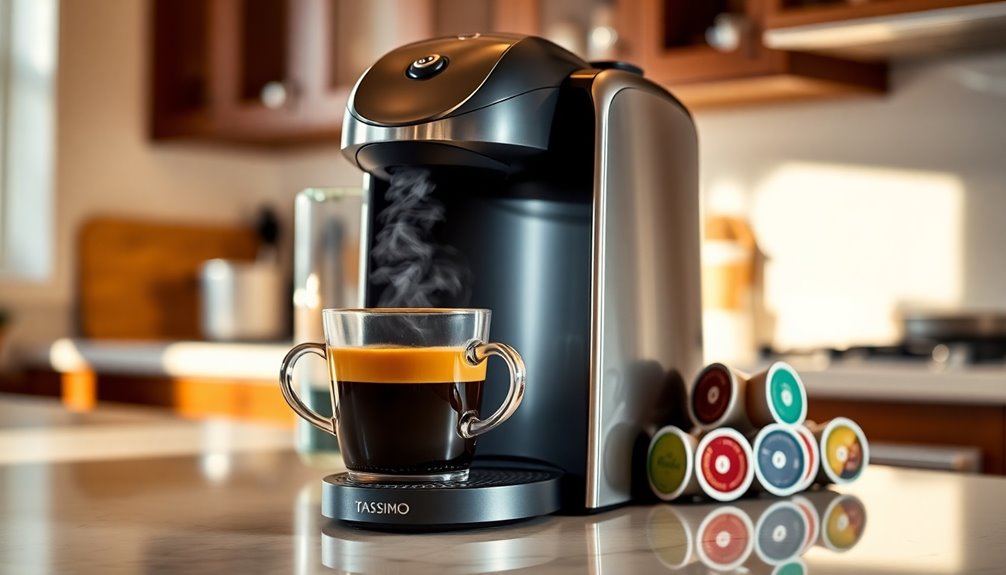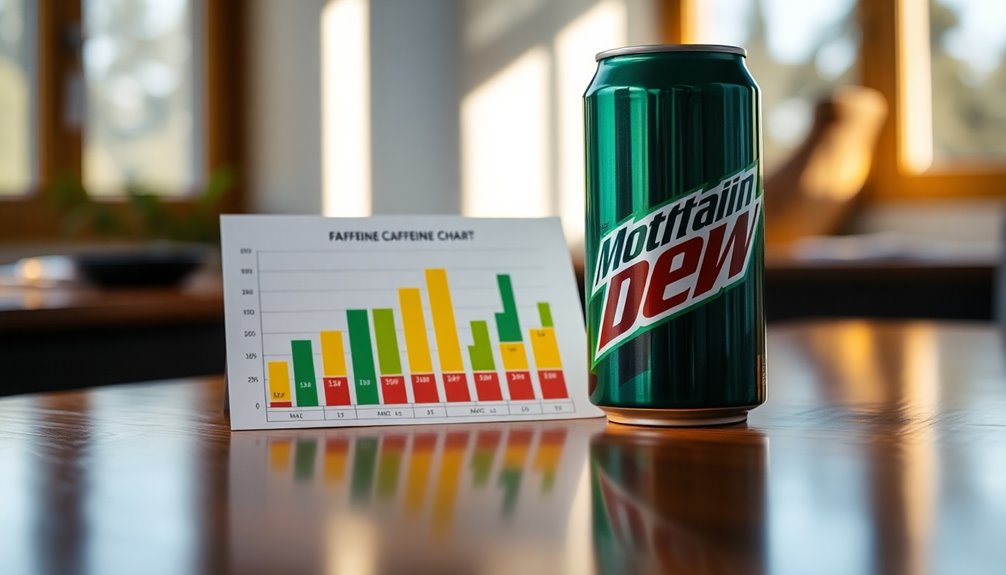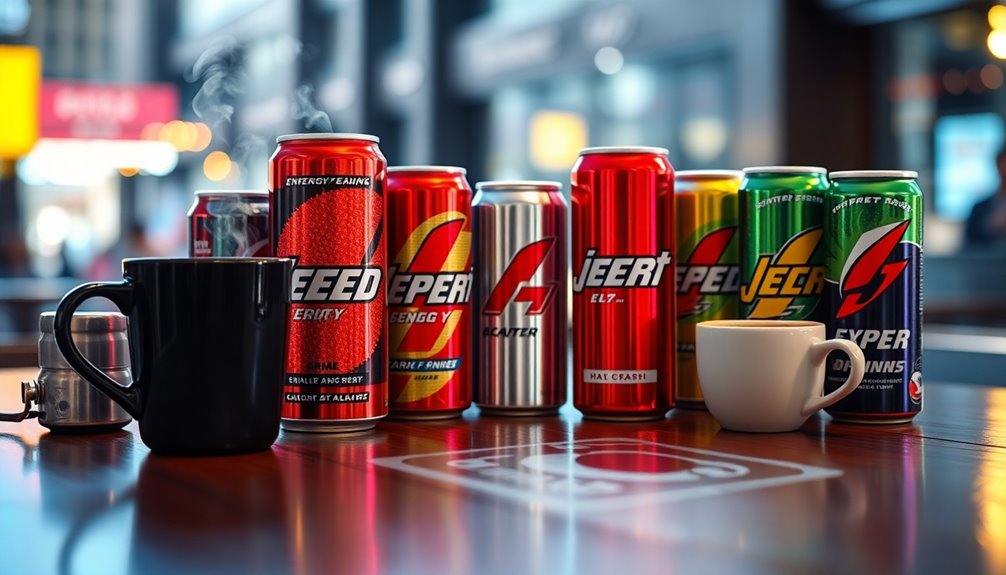If you have diverticulitis, drinking coffee might not be the best choice for you. The caffeine can stimulate bowel contractions and potentially worsen your symptoms. Plus, coffee's acidity could irritate your digestive tract, leading to discomfort like gas and bloating. It's important to monitor how coffee affects you personally; some people may need to limit or even avoid it, especially during flare-ups. Managing your diet with a high-fiber intake and consulting with a healthcare professional can help. To gain more insights on managing your condition, you might want to explore other dietary considerations and lifestyle adjustments.
Key Takeaways
- Coffee consumption may exacerbate diverticulitis symptoms due to its high caffeine content stimulating bowel contractions and increasing stomach acid.
- The acidity in coffee can irritate the digestive tract, potentially leading to discomfort and worsening symptoms.
- Individuals with diverticulitis should monitor their personal reactions to coffee, adjusting intake based on tolerance levels.
- Limiting or avoiding coffee during flare-ups is recommended for effective symptom management and to reduce irritation.
- Maintaining a high-fiber diet and staying hydrated are crucial for overall digestive health and preventing diverticulitis complications.
Understanding Diverticulitis

When you think about digestive health, diverticulitis is a condition that often comes to mind due to its serious implications. It involves the inflammation or infection of small pouches called diverticula in the colon, often resulting from increased pressure during bowel movements.
If you have diverticulosis, there's a 10-25% chance you could develop diverticulitis, leading to severe abdominal pain, fever, and changes in bowel habits. A low-fiber diet is a significant risk factor, contributing to the condition's prevalence, especially in individuals over 40.
To maintain a healthy digestive system, it's essential to consume adequate fiber. If you experience symptoms, consult a healthcare professional promptly, as untreated diverticulitis can lead to serious complications requiring surgical intervention.
Effects of Coffee on Symptoms

Although many people enjoy coffee for its stimulating effects, it can pose challenges for those with diverticulitis. The high caffeine content in coffee can stimulate bowel contractions, potentially increasing symptoms like abdominal pain and cramping.
Additionally, coffee's acidic nature may irritate your digestive tract, leading to greater discomfort and worsening diarrhea during flare-ups. Studies suggest that caffeine might contribute to inflammation, complicating your diverticulitis symptoms further.
Furthermore, high caffeine intake is linked to increased stomach acid production, which can result in gas and bloating, aggravating your condition. For these reasons, it's generally recommended to limit or avoid coffee and other caffeinated beverages to help manage your symptoms effectively.
Dietary Recommendations

To effectively manage diverticulitis, you'll want to focus on a balanced diet that prioritizes fiber intake. Aim for a high-fiber diet of 20-35 grams per day, incorporating foods to eat like fruits, vegetables, and whole grains to prevent flare-ups.
However, during flare-ups, switch to a low-fiber diet, restricting raw fruits and vegetables, nuts, seeds, and legumes to 10-15 grams daily.
After recovery, gradually reintroduce fiber, choosing non-irritating foods to ease digestion. Hydration is key when increasing fiber, as it helps prevent constipation and supports overall digestive health.
Always consult healthcare professionals for personalized dietary advice, especially when reintroducing potentially irritating foods after an episode of diverticulitis.
When to Avoid Coffee

If you're experiencing a diverticulitis flare-up, it's best to steer clear of coffee. Consuming coffee can worsen your symptoms and aggravate abdominal pain.
Here are a few reasons to avoid it during flare-ups:
- Coffee may increase bowel contractions, leading to more discomfort.
- Its acidic nature can irritate your digestive tract, worsening diarrhea.
- Caffeine acts as a stimulant, potentially causing gas, bloating, and cramping.
- High caffeine intake may elevate the risk of recurrent diverticulitis flare-ups.
Monitoring your symptoms closely is essential, and eliminating coffee and other caffeinated beverages can help prevent further complications.
Prioritizing your digestive health means making informed choices about what you consume during these challenging times.
Managing Flare-Ups

When managing flare-ups, you'll want to focus on your diet and how it affects your symptoms.
Start with a clear liquid diet and gradually introduce low-fiber foods as you feel better.
Pay attention to what triggers your symptoms, including your coffee intake, to help prevent future issues.
Dietary Adjustments During Flare-Ups
Managing a diverticulitis flare-up requires careful dietary adjustments to ease symptoms and promote recovery. Your diet is essential during this time, so consider the following:
- Start with a clear liquid diet, including broth and clear juices without pulp.
- Gradually reintroduce low-fiber foods like canned or cooked fruits and vegetables without skins or seeds.
- Aim for small, frequent meals (5-6 times daily) to avoid overwhelming your digestive system.
- Guarantee adequate hydration by drinking at least eight glasses of water daily.
These steps not only help alleviate discomfort but also support your path to recovery.
Once you're feeling better, shifting to a high-fiber diet will help prevent diverticulitis flare-ups in the future.
Monitoring Symptoms and Triggers
After making dietary adjustments during a flare-up, it's important to keep an eye on your symptoms and potential triggers. Monitoring how specific foods affect your symptoms, especially coffee and other caffeine-containing beverages, can help you manage diverticulitis more effectively.
Keep a food diary to identify personal triggers that may lead to flare-ups, like certain high-fiber foods or processed items. Pay attention to symptoms such as abdominal pain, fever, and changes in bowel habits, as these can signal the need for timely medical intervention.
Don't forget about hydration; increased fiber intake and caffeine can influence stool consistency. Consulting with your healthcare provider about dietary changes and symptom monitoring can strengthen your management plan for diverticulitis. Additionally, incorporating low carb foods into your diet may help reduce inflammation and support digestive health.
Long-term Health Strategies

To manage diverticulitis effectively over the long term, focus on a high-fiber diet, regular exercise, and monitoring your personal triggers. Incorporating more fruits, vegetables, and whole grains can make a big difference in your digestive health. Additionally, consider adding chia seeds to your diet, as they are a rich source of dietary fiber that can aid digestion and promote bowel regularity.
Dietary Fiber Importance
Dietary fiber plays an essential role in maintaining digestive health and preventing conditions like diverticulitis. To keep your digestive system functioning smoothly, consider these tips:
- Aim for 20-35 grams of fiber daily.
- Incorporate high-fiber foods like oats, beans, and fruits.
- Gradually reintroduce fiber-rich foods post-flare-up.
- It's important to drink plenty of water when increasing fiber intake.
A high-fiber eating plan helps soften stool, promoting regularity and reducing the risk of diverticulitis flare-ups.
In contrast, a low-fiber diet can lead to constipation and increased colonic pressure.
By committing to a fiber diet and ensuring hydration, you can support long-term digestive health and enjoy a more comfortable life.
Regular Exercise Benefits
While many focus on diet alone, regular exercise is equally essential for maintaining digestive health and reducing the risk of diverticulitis. Engaging in moderate to vigorous physical activity helps improve bowel regularity and circulation, which can alleviate symptoms by reducing inflammation in your gastrointestinal tract.
Studies show that sticking to a consistent exercise routine may lead to fewer diverticulitis flare-ups and better recovery during episodes. Additionally, regular exercise aids in maintaining a healthy weight, a key factor in managing diverticulitis risk since obesity is linked to higher incidence rates.
Aim for at least 150 minutes of moderate aerobic exercise each week to promote better digestive health and potentially reduce the pressure on your colon, decreasing the likelihood of developing diverticula.
Monitor Personal Triggers
Regular exercise sets a solid foundation for digestive health, but understanding your personal triggers is equally important in managing diverticulitis.
By monitoring your diet and symptoms, you can identify which foods lead to flare-ups. Keeping a food diary is an effective way to pinpoint these triggers and tailor your dietary choices.
- Common triggers to watch for:
- Nuts
- Popcorn
- Certain fruits
- Processed foods
Consulting with healthcare providers can enhance your understanding of these personal triggers and help develop effective management strategies.
Engaging in ongoing education about diverticulitis empowers you to make informed decisions, ultimately improving your long-term health.
Prioritize monitoring your diet to support your digestive wellness.
Frequently Asked Questions
Can Coffee Aggravate Diverticulitis?
Yes, coffee can aggravate diverticulitis. Its high caffeine content stimulates bowel contractions, which might worsen abdominal pain and cramps. Additionally, those suffering from diverticulitis should be cautious about their overall dietary choices, as certain foods and beverages can exacerbate symptoms. Moreover, it’s important to consider potential coffee and ibuprofen interactions, as combining these substances may lead to increased gastrointestinal discomfort. Reducing coffee intake could help manage symptoms more effectively while promoting better digestive health.
Additionally, coffee's acidity can irritate your digestive tract, potentially leading to increased diarrhea and discomfort.
Research suggests that caffeine consumption may heighten the risk of diverticulitis symptoms, so it's vital to exercise caution.
If you're experiencing flare-ups, avoiding coffee and other caffeinated beverages is often recommended to help manage your symptoms effectively.
What's the Worst Thing for Diverticulitis?
When it comes to diverticulitis, think of your gut as a delicate garden—it needs care and attention.
The worst thing for diverticulitis is high-fiber foods, especially during flare-ups. Raw fruits, vegetables, nuts, and seeds can stir up trouble.
You'll also want to avoid spicy foods and caffeine, which can crank up irritation.
Processed foods packed with sugar can worsen constipation, making your garden even more unruly.
Keep it simple for your gut's sake!
What Triggers Diverticulitis Flare-Ups?
Diverticulitis flare-ups can be triggered by several factors.
You might find that a low-fiber diet increases your risk, as it can lead to constipation and straining during bowel movements. Certain foods, like nuts, seeds, and popcorn, can also exacerbate symptoms.
Additionally, stress and lack of physical activity can contribute to flare-ups.
It's crucial to monitor your diet and lifestyle to help manage and prevent these uncomfortable episodes effectively.
What Is the Best Drink for Diverticulitis?
Think of your digestive system like a garden; it thrives on hydration.
When you're managing diverticulitis, the best drinks are those that nourish without causing weeds to sprout, like herbal teas and clear broths.
Aim for at least eight glasses of water daily to keep things flowing smoothly.
Pulp-free fruit juices and low-fiber smoothies can also help, offering hydration and nutrients while being gentle on your system.
Conclusion
To sum up, while you might worry that coffee could worsen your diverticulitis, it's all about moderation and listening to your body. If you enjoy your morning brew and it doesn't trigger any symptoms, there's no need to cut it out completely. Just be mindful of how it affects you personally. Balancing your coffee intake with a healthy diet and managing flare-ups can help you maintain your well-being without sacrificing your favorite drink.









